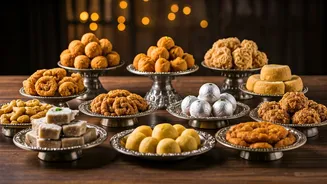Sweet Offerings
The festival of Diwali is synonymous with sweets, and for good reason: they represent prosperity, happiness, and sweetness in life. For both Goddess Lakshmi
and Lord Ganesha, sweets are a central element of the offerings. Among the most popular choices are ladoos, especially motichoor and besan ladoos, known for their auspiciousness. Then there is the barfi, in its various forms, such as kaju katli or milk barfi, which symbolize richness and abundance. Moreover, gulab jamun, with its deep-fried dough balls soaked in rose-flavored sugar syrup, represents the joy and sweetness of life. These sweets are traditionally presented during the pooja, and their presence is believed to invite blessings and good fortune into the home.
Savory Delights
While sweets are prominent, savory dishes also play a vital role in Diwali celebrations. The intention is to create a complete and balanced offering, to satisfy both the divine and the devotees. For instance, the savory snacks often include namkeen mixtures, which offer a delightful blend of textures and tastes, and their presence adds variety to the offerings. Another common inclusion are mathri, a flaky, savory biscuit that adds a comforting touch, and samosas, a deep-fried pastry filled with spiced potatoes or vegetables, offering a hearty element to the feast. These savory components complement the sweets, creating a balanced and fulfilling Diwali offering.
Fruits and Nuts
Fruits and nuts represent abundance and are considered a blessing from the divine. For both Lakshmi and Ganesha, fresh fruits, like bananas and mangoes, are often offered, signifying prosperity. These fruits are easily accessible and are a symbol of nature's bounty and the sweetness of life. Additionally, dry fruits and nuts, like cashews, almonds, and pistachios, add richness and are associated with good fortune. These nuts are often beautifully arranged, symbolizing wealth and well-being. The practice of offering fruits and nuts emphasizes the importance of gratitude and abundance in life.
Kheer and Payasam
Kheer and Payasam are creamy desserts, considered auspicious and a sign of purity. Kheer, a rice pudding cooked with milk and sugar, is a traditional offering. The creamy texture and sweet taste are seen as an invitation to the gods, signifying a sweet beginning and a prosperous life. Another popular choice is payasam, a South Indian sweet dish made from milk, sugar, and vermicelli or rice. Its creamy texture and rich flavor makes it an ideal treat for the festive occasion. The making and offering of kheer and payasam reflect the importance of hospitality and the sharing of sweetness.
Coconut's Significance
Coconuts hold a special place in Hindu rituals, symbolizing purity and auspiciousness. They are often cracked open during poojas as an offering, symbolizing breaking one's ego and surrendering to the divine. The coconut's white flesh represents purity and completeness, while the water symbolizes new beginnings and cleansing. Furthermore, coconuts are offered whole, as a symbol of prosperity and a complete offering. Its presence in the Diwali offerings is considered essential for invoking blessings.
Paan and Supari
Paan and supari are traditional after-meal refreshments offered to deities, signifying respect and hospitality. Paan, a betel leaf filled with areca nut and other spices, offers a refreshing taste and is considered a gesture of hospitality. Moreover, the betel leaf's green color and natural aroma symbolize freshness. Supari, or areca nut, is often included, symbolizing the completion of the offering and the end of the ritual. The inclusion of paan and supari after the food offerings completes the experience and is a tradition.
Ghee's Importance
Ghee, or clarified butter, is considered sacred and is essential in Hindu rituals. It symbolizes purity, auspiciousness, and is often used in lamps and food offerings. Adding ghee to the food is considered a way to sanctify the offering, inviting divine blessings. Additionally, ghee is often used to light diyas, which represents enlightenment and the dispelling of darkness. The aroma of ghee is also thought to purify the environment, enhancing the spiritual significance of the Diwali celebrations.
Importance of Variety
Offering a variety of foods is a custom during Diwali, allowing for a balanced and comprehensive offering to the deities. This diversity reflects the abundance and diversity of life, showcasing the various flavors and textures of the foods. The variety allows for different tastes and preferences to be accommodated, making the offering inclusive. It also demonstrates the importance of enjoying the moment with different elements that appeal to everyone. This approach encourages a sense of celebration and shared joy within the home.
Making Offerings
The act of offering food to Goddess Lakshmi and Lord Ganesha during Diwali is a heartfelt gesture of gratitude and reverence. Preparing the food with care and devotion is key. It's believed that the sincerity with which the offering is made is more important than the complexity of the dishes. Placing the food on a clean surface, typically a plate, and presenting it to the deities with prayers is the standard practice. This creates a connection with the divine, making the celebrations a truly spiritual experience. These offerings are then distributed amongst family and friends, reinforcing the bonds of community.













